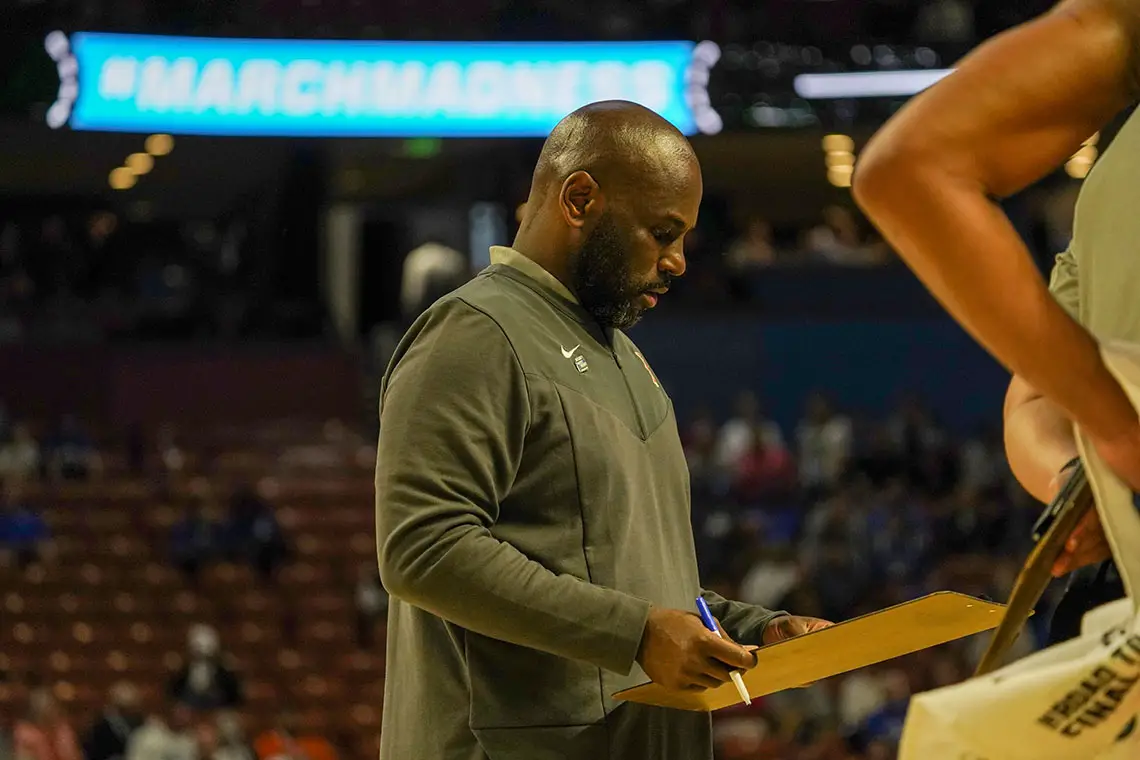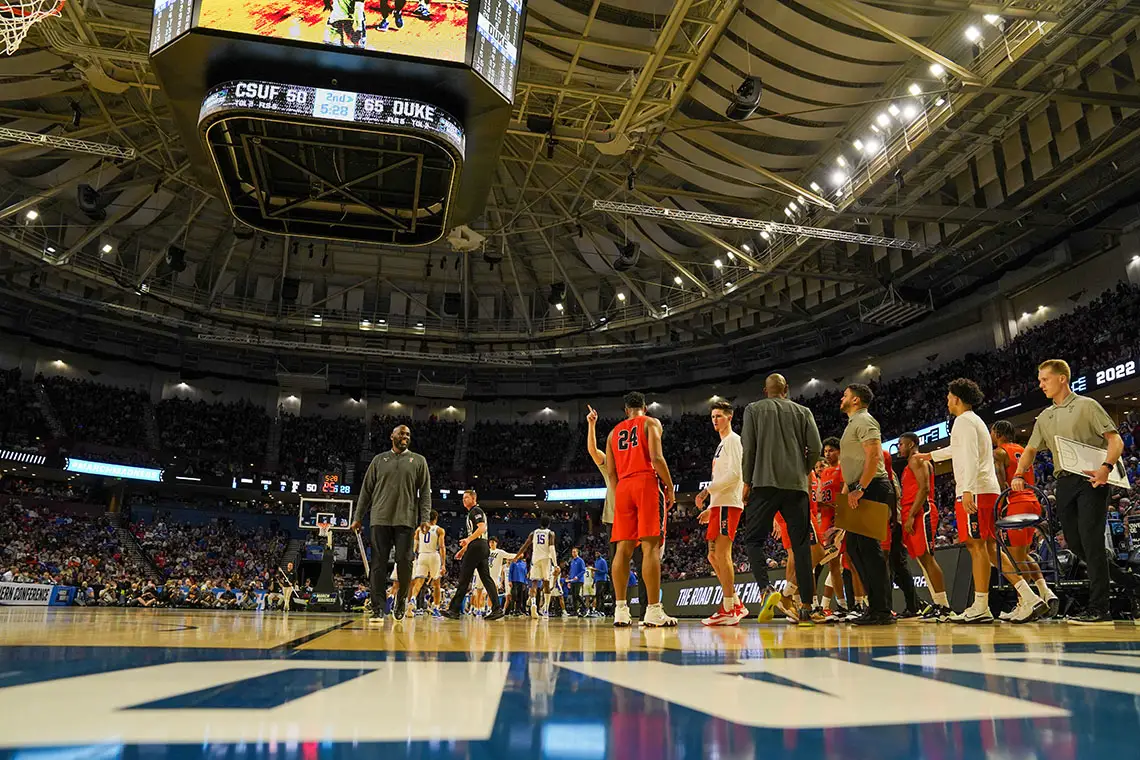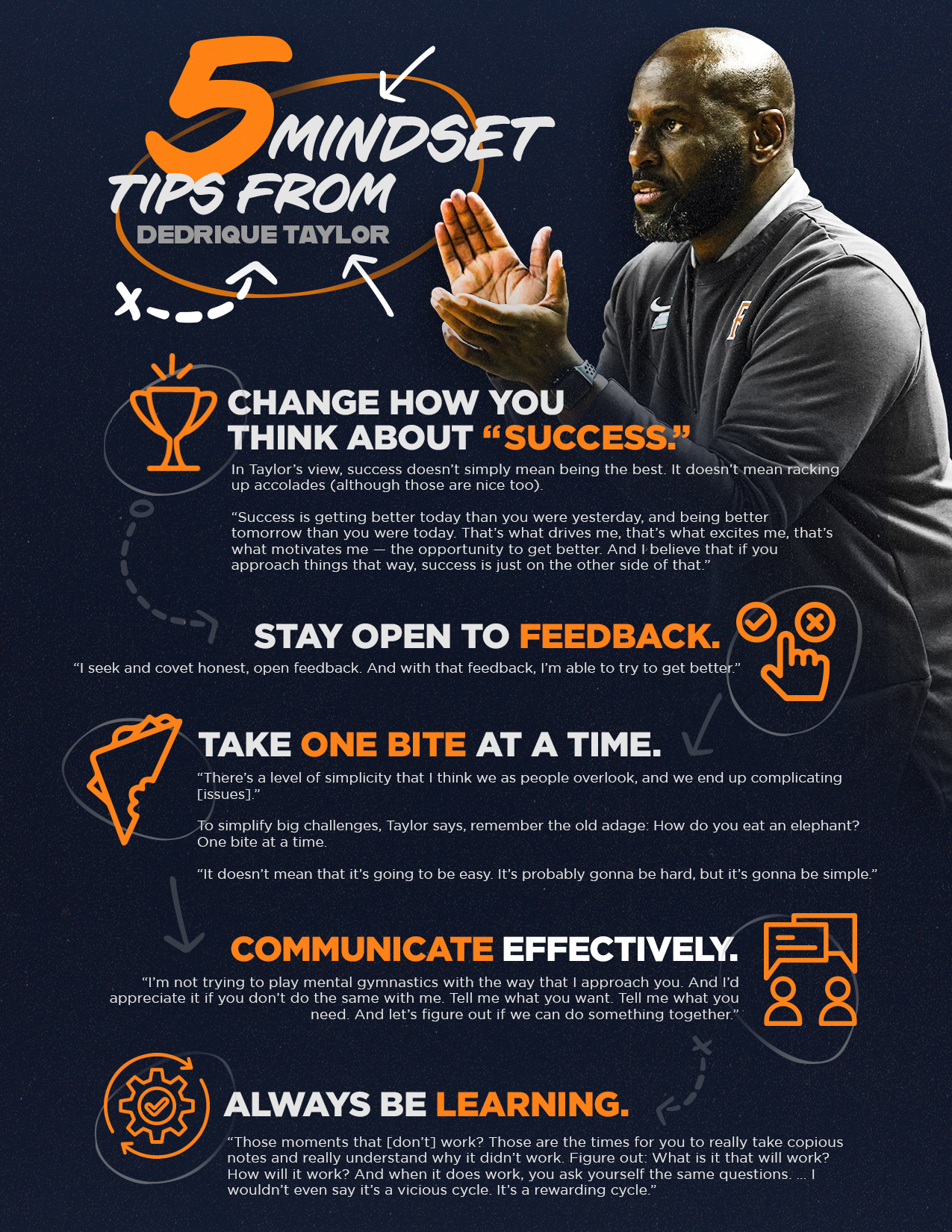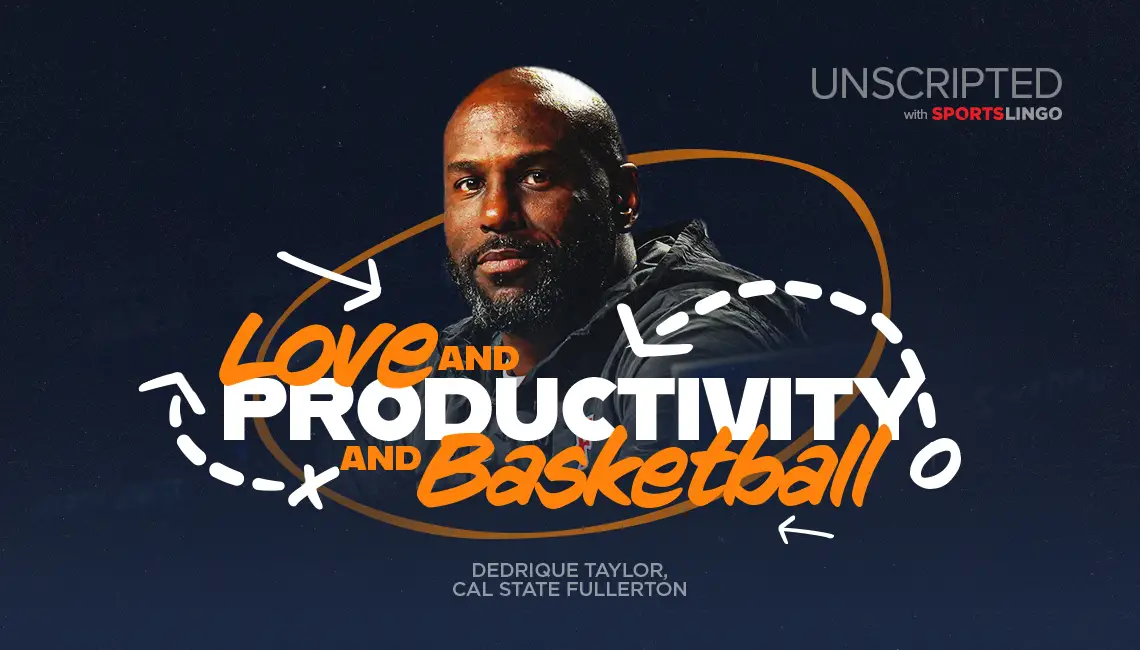Cal State Fullerton Head Men’s Basketball Coach Dedrique Taylor on the life-changing clarity that drives his actions on and off the court
Picture an athlete and the words we use to describe them: Strong. Fast. Flexible. Powerful. We revere athletes for what their bodies can do.
For Cal State Fullerton Head Men’s Basketball Coach Dedrique Taylor, basketball isn’t just about talented athletes running drills or practicing free throws. It’s fundamentally about the mind.
As the son of a basketball coach, Taylor learned from a young age to approach the sport from a coach’s perspective.
One of Taylor’s earliest memories is being two years old and bouncing a basketball in a gym. He loved it, and he spent the rest of his childhood playing under the tutelage of his Hall-of-Famer father, Ed Taylor. “He’s won more titles than I can remember,” Taylor says. “Success is something that I saw at an early age.”
Taylor’s father didn’t simply demonstrate how to win games. He modeled a caring approach both on and off the court.
“I’m a chip off the old block,” Taylor says. “Because of who [my father] was in my life, but more so because of who he was in our community — what he believed in and what he stood for. What I learned from my dad is how to treat people in basketball on and off the floor. Success is not necessarily dictated by winning and losing; it’s his impact on … multiple lives.”
In Taylor family fashion, he has gone on to transform the lives of countless athletes, trainers, and coaches through his work as a coach and leader of the organization Think Tank. His impact reflects his life’s mission: to lead with love and productivity.
That mission crystallized during a life-changing experience a mere two years ago. But the seeds were planted much earlier.
Not a coach
Thanks to his father, Taylor grew up witnessing the broad impact coaches have on athletes and communities. It was common for community members to honk, wave, or stop for a chat whenever Taylor’s father was out in front of their house.
“That just resonated with me,” Taylor says. “And I thought to myself that I wanted to be a part of that experience.”
But Taylor didn’t want to be a coach. “I didn’t want to impact lives in that particular category or use that platform,” he says.
What Taylor did know, even at a young age, is that he wanted to play basketball.
As a kid, he played at the Boys and Girls Club, where his father also coached. His dad coached him all the way through junior high and most of high school.
After high school, Taylor enrolled at Kings River Community College (now Reedley College), where he played for two years before transferring to DII Armstrong Atlantic State. But Georgia wasn’t a great fit for Taylor, who’s a Californian through and through.
“I quickly got out of there and went to UC Davis,” he says. That’s where he finished out his collegiate career.
After graduating, Taylor played for a while overseas, then returned to the United States to pursue a master’s degree while working as a substitute teacher.
“I was figuring out, ‘Okay, the ball is going to stop bouncing here pretty soon. What do you want to do?’”
Not a sports agent
Early in his career, Taylor thought he wanted to be a sports agent. He started working in the basketball division of a sports agency, and he enjoyed supporting young athletes — working with them one-on-one and empowering them to succeed.
Whereas other agents would sign an athlete and pass them off to trainers, Taylor would get in the gym and work out with his recruits.
“That was really, really important to me, because it gave me an opportunity to connect with a player,” Taylor says.
But he quickly learned the cutthroat world of sports agencies didn’t align with his personal values. “I started to realize what was being said was not what was being done, and I didn’t like it,” Taylor says.
Despite his early aversion to coaching, it occurred to him that coaching would allow him to embrace the aspects of being an agent that had most appealed to him:

Dedrique Taylor draws up a play during a time out.
building relationships with players and helping them be the best versions of themselves.
So he left the sports agent business and returned to UC Davis — this time as a volunteer assistant coach. He stayed in that role for a year, and it jump-started his coaching career.
From UC Davis, Taylor went on to coach at Loyola Marymount University, Portland State University, University of Nevada, and Arizona State University, where he recruited now-NBA superstar James Harden and coached from 2006 to 2013 — first as assistant men’s basketball coach and then associate head men’s basketball coach.
In 2013, Taylor accepted the role of head men’s basketball coach at Cal State Fullerton. A mid-major in the Big West known for its baseball team, CSUF hadn’t seen much success in basketball when Taylor took on the role. Since then, he’s led the university to prominence and become the most successful men’s basketball coach in school history. He’s taken the team to the NCAA Tournament twice, and last season they faced off against Duke in the first round.
Riding the roller coaster
In many ways, Taylor spent his whole life preparing to become a head coach — even during the years when he thought coaching wasn’t for him.
But that doesn’t mean the gig has come easy.
“It’s been quite the roller coaster of different emotions and learning opportunities,” Taylor says.
While he’s grateful for the accolades he’s received, Taylor says the most impactful lessons have arisen outside of the public eye — usually at his lowest moments. “They were the greatest opportunity to really strip down myself and figure out what I believe and what I stand for.”
One example?
During his third year as head coach, the team was 7-2 and experiencing one of its more successful seasons after what Taylor calls two “abysmal” years. “I felt like we were kind of turning the corner,” he says.
Then two core players were suspended for the remainder of the season. It was, Taylor says, “a monumental blow.”
The team’s stats plummeted, and they lost all but a few of their remaining Big West Conference games.
“I would find myself in the wee hours of the morning, wondering if I was enough,” Taylor recalls. “I began to question my ability to lead this program and lead this group to success.” He was three years into a four-year contract, and he didn’t know if he’d be able to keep the job. “I just remember the times being very, very dark.”
As we all know now, Taylor turned things around.
During the 2017-2018 season, he guided the Titans to a Big West Tournament Championship and a trip to the NCAA Tournament — their first trip since the 2007-2008 season, and just their third trip ever at the time.
Most recently in the 2021-22 season, his team overcame many hurdles and catapulted to a 21-11 overall record and 11-4 in the Conference. This was followed by another Big West Tournament Championship and an NCAA Tournament berth, where they faced off against and eventually fell to Duke and legendary coach Mike Krzyzewski.
Recent successes, however, haven’t overshadowed the lessons from his early years in coaching. Even on the other side of that dark tunnel, Taylor remains grateful for those long, painful nights. “I look at those [low points], and I’m so appreciative that I was able to have them,” he says. “Because I’m able to answer those questions.”

Dedrique Taylor and the Titans during a timeout against Duke in the First Round of the 2022 NCAA Tournament.
Finding clarity
Taylor found more answers to life’s big questions as a result of the COVID-19 pandemic. In fact, the pandemic might just be the reason he’s still here.
“When COVID first started and shut the world down, I was able to go through an experience that totally cleared things up for me [in terms of] why I act the way I act and what I’m driven by,” Taylor says.
In the season leading up to the first shutdown, Taylor was experiencing intense headaches. When the world (and the season) slowed down, he finally had time to see a doctor.
As it turned out, he had a brain tumor. Within just a few days, he was scheduled for surgery.
In the early morning hours before surgery, Taylor found himself awake and anxious — alone in his hospital bed due to restrictions on visitors. “I don’t know what’s going to happen,” he recalls. “I don’t even know if I’m gonna make it. I might die.”
He started talking out loud, asking the questions that some of us spend our whole lives avoiding: What is my purpose? Why am I here? What should I do?
“I began to have a conversation with what I thought was myself,” he says. “But really, it was a conversation between me and God. I’m saying, ‘How am I supposed to respond? Because we got COVID; we got the racial strife that’s going on; we got all of these negative things and these hateful, resentful things. How am I supposed to respond to these things?’”
He didn’t have to wait long for an answer.
“Immediately, the answer came to me,” Taylor says. “God said, ‘I need you to respond in love and productivity. And if it’s not those two things — if you’re not operating from those two spaces — you’re doing yourself and all the other people around you a disservice.’”
That experience clarified Taylor’s life mission. “Hate is so viable in our society today,” he says. “I choose to operate from a space of love and trying to be productive. And it’s important not only for me, but also for the people around me: How can we be better? How can we act in a productive way to be better through love?”
Extending love off the court
An ethos of love informs Taylor’s actions both on and off the court. When he’s not coaching, Taylor can be found coordinating events for his leadership organization, Think Tank.
The inspiration for Think Tank stems back to when he was an assistant coach and was invited to join Nike Villas 7. The program selected 50 standout assistant coaches and brought them together for a few days of workshops, talks, and interviews to prepare them for the next level of coaching.
“That’s what the concept of Think Tank was built around,” Taylor says.
After he’d been working in the role of head coach, he noticed that a lot of assistant coaches were looking to him for guidance. “And I was like, ‘Let’s just get in a room after the season and have these conversations,’” Taylor says.
In its inaugural year, Think Tank brought together 16 Black coaches from all levels — high school, college, AAU — to discuss the behind-the-scenes aspects of coaching and learn from each other. Conversations ranged from fundraising and academics to finances, mental health, networking, and more.
“There is a certain amount of things that you do outside of basketball that determine whether you are successful as a head coach,” Taylor says. “And if you’re not prepared for them? Man, they can run you over.”
Think Tank exists to prevent coaches from being run over — and to help them thrive. “There’s this whole circle of networking and opportunity,” Taylor says.
While much of the organization’s work came to a halt during COVID, Think Tank has continued to offer some sessions over Zoom. And Taylor has big plans to bring back in-person sessions.
“The goal is just to continue to connect different people that wouldn’t otherwise be connected,” Taylor says. “It’s to provide the space for change to happen.”
Still dribbling
It’s been a long time since two-year-old Taylor fell in love with the feeling of a basketball in his hand. But he’s never lost his commitment to the game.
“I still do love basketball,” he says. “From this seat [as head coach], that love looks different. You sit and watch the game differently; you receive information differently; and it creates a different level of love.”
But it’s still love. And that’s what Taylor is all about.

